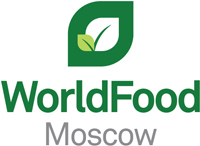1,500 exhibitors at WorldFood Moscow
More than 30,000 trade visitors from 81 Russian regions and 96 countries attended the fair, once again confirming the event’s importance.
“Russia is our largest market, and since 2013 the volume of exports there has kept growing,” said Jorge Manobanda, business manager of the company Delindecsa.
“Currently, 40-50% of Ecuadorian bananas are sent to Russia. However, this season was different: the volume of banana crop in Ecuador has decreased, so the shipments to Russia decreased accordingly. We still expect production will increase as of week 45, however.”
Delindecsa exports its bananas to the Middle East, Greece, Italy and the US, but Russia with 40% of exports remains the largest market. Participation in WorldFood Exhibition in Moscow enables the company to meet its clients and find other potential customers.
Uzagroexport unites producers from Uzbekistan
Navoiy Agrovet Farm is part of the holding of Uzbek producers Uzagroexport, exporting fruit and vegetables since 1999 mainly to Russia and Germany.
“We supply a large range of dry products, including melon, squash, onion, carrot, potato and herbs. The dry vegetables are available all year round,” said Abdusattor Nigmonkhodjayev, director of Navoiy Agrovet Farm. “We also export fresh fruit in summer. Our partners are Russian and German retailers.”
The representative of the holding took part in the WorldFood Moscow exhibition in order to expand penetration into the Russian market.
Maroc Citrus streamlines its Russian market
“We succeeded in streamlining our citrus market two years ago,” said Hassan Zouhry, one of the representatives of Maroc Citrus at WorldFood Moscow Fair. “Now the export market is more organised; though the export volume has decreased, the quality of the citrus fruit supplied is higher, and the prices became higher respectively, which is more profitable for Moroccan farmers.” However, the professionals of the sector are brought to face significant challenges.
The production recorded 2 million tons thanks to investments made by the industry; besides the area planted with citrus orchards in 2016 amounts to 120,000 ha, which exceeds the goal set by the government. Another challenge is the situation in the Russian market – the largest client for Moroccan citrus. “Some 40 % of all production volume is shipped to Russia,” Zouhry said.
“Last season we were had no difficulties in export due to embargo imposed at European and Turkish citrus. This year Turkey, our main competitor, will probably come back to Russian market, and the volume of supplies may decrease.”
It means the producers need to diversify the export markets. That is why the combined efforts of all the operators of the sector are required, along with the coordination and support of Maroc Citrus Federation.
Since its creation in 2009, Moroccan Interprofessional Federetaion of citrus (Maroc Citrus) has been working hand in hand with governmental institutions to develop and promote the national citrus industry. Its aim is to strengthen the citrus sector in terms of production, valorisation and marketing. The ambitious program adopted in 2008 by Moroccan government intends the commitment of all the players of citrus sector, and today’s results are very optimistic.
Clementina among the successful Moroccan exporters
“Russia has traditionally been our main market,” said Hicham Rhissassi, business development director. “Russian consumers choose our products for their taste, appearance, etc. At the same time, thanks to the high strictly controlled quality of our fruit we can diversify our markets and supply countries such as Great Britain, Canada, the US. Saudi Arabia and Arabian Emirates have been developing at a fast pace; China is another key market with exceptional potential.
There is a special committee in Morocco surveying the quality of exported products and regulating the volume of export for each company. It helps to structure and to orchestrate our market.”
Stable market for Egyptian produce
Russia remains one of the principal clients of Daltex.
“The current market situation there is stable; we continue our partnership with the same customers, although their purchase volume has reduced,” said Daltex marketing director Mohamed El Kahhal. Daltex has been diversifying its markets, supplying potatoes to the Middle East and to Europe.
As for citrus fruit, Asia in general and China in particular seem to be the most promising markets. “It is probable we will extend our assortment with own carrot,” said El Kahhal. “Last year its offer was excessive and many players may disappear, then we will take their place at the market.” In order to provide better customer support, Daltex has opened numerous branch offices all over the world.



